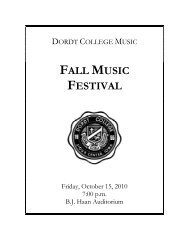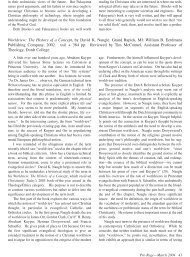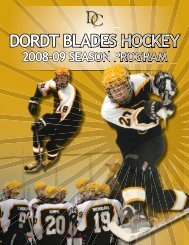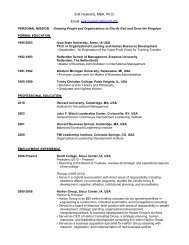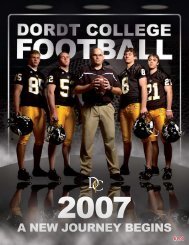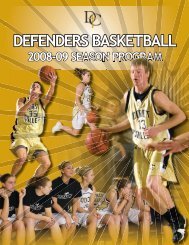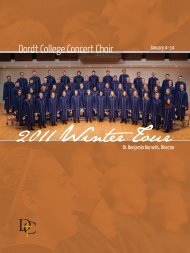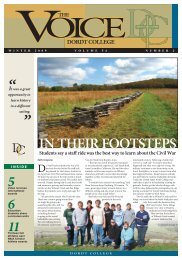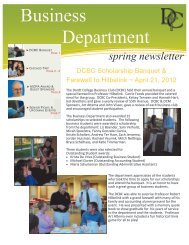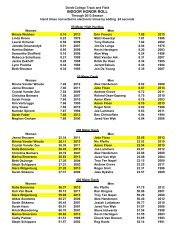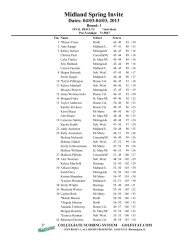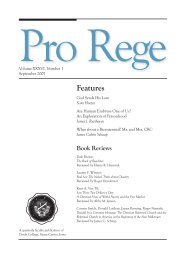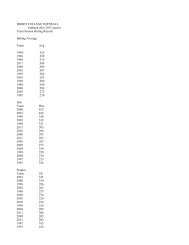June 2009 - Dordt College
June 2009 - Dordt College
June 2009 - Dordt College
Create successful ePaper yourself
Turn your PDF publications into a flip-book with our unique Google optimized e-Paper software.
And they all claim “the fire did it.” In one of the<br />
great spins in the Bible, Aaron says, “I threw the gold<br />
in the fire and—out came this calf.” Right naming<br />
counteracts our tendency to blame others and to call<br />
our disobedience something else.<br />
In an article in Capital Commentary, a publication<br />
of the Center for Public Justice in Washington, D.C.,<br />
James Skillen, who taught a few years at <strong>Dordt</strong> and<br />
went on to head that organization, reviews the<br />
following statistics about the US economy: “In the<br />
26 years between 1979 and 2005, the pre-tax income<br />
for the poorest households grew by 1.3 per cent a<br />
year, middle incomes before tax grew by less than 1<br />
per cent a year, while those of households in the top<br />
1 per cent grew by 200 per cent pre-tax, and more<br />
strikingly, 228 per cent post-tax.” Skillen quotes<br />
John Plender, of Financial Times, who says that<br />
income inequality in the U.S. today “is at its highest<br />
since that most doom-laden of years: 1929.” That<br />
statistic is staggering, and what is impressive is that<br />
Skillen dares to call the governmental policies that<br />
precipitated that statistic not natural outcomes of an<br />
established system, not even mistakes, but immoral<br />
injustice on the government’s part. That puts the<br />
discussion on a different plane, one perhaps that<br />
matches God’s reality.<br />
During Justice Week at <strong>Dordt</strong>, on November<br />
2, 2006, John Hiemstra, a <strong>Dordt</strong> alumnus and<br />
Professor of Political Studies at The King’s University<br />
in Edmonton, Alberta, Canada, spoke on the topic<br />
“Hypnosis, the Myth of Progress, and Our Christian<br />
Scholarly Calling,” a speech that focused on the<br />
development of the oil sands in Alberta. The speech<br />
was reprinted in a recent <strong>Dordt</strong> Pro Rege. In his<br />
speech he demonstrated how a Christian scholar<br />
approaches major cultural problems of our times—<br />
in part by looking at the language and metaphors<br />
that are used in the discussion and asking for more<br />
accurate names. Hiemstra showed how a writer<br />
for the Edmonton Journal used the metaphor of “an<br />
economic superhighway” with a few “potholes” in<br />
describing the oil sands. Here is Hiemstra’s analysis of<br />
the language: “Potholes may cause inconvenience and<br />
discomfort, but they are not understood to signal any<br />
fundamental problems with the superhighway itself.<br />
The metaphor of potholes in a superhighway implies<br />
that the highway itself is sound and heading in the<br />
correct direction” (Pro Rege 36.3.18). Hiemstra ends<br />
his analysis in a call for Christian scholars, especially<br />
in Christian higher education, to work out biblically<br />
inspired approaches to major cultural situations,<br />
which include the accurate use of language. When<br />
we talk honestly about an issue, sometimes we realize<br />
that the supposed progress, as in this case, may need<br />
to be stopped altogether.<br />
We wanted to teach you how to courageously,<br />
insightfully, and truthfully name reality from a<br />
biblical point of view, and we wanted to caution you<br />
with the words of Isaiah 5: “Woe to those who call<br />
evil good and good evil. Who put darkness for light<br />
and light for darkness. Who put bitter for sweet and<br />
sweet for bitter.”<br />
Our son, Luke, a <strong>Dordt</strong> grad, writes for television.<br />
He has found that even within the constraints of team<br />
writing and quite prescribed story lines, there is often<br />
an opportunity to call dark “dark” and light “light.”<br />
One year Luke was writing for Smallville, the story of<br />
the high school days of Clark Kent, Superman. Lex<br />
Luther is his eternal enemy in the disguise of a friend.<br />
Here is one scene between Lex and his father, Lionel,<br />
who at one time was as evil as Lex is becoming, a<br />
scene in which Luke had an opportunity to call dark<br />
“dark” and light “light”:<br />
LIONEL: Listen to me, Lex. I know where you’re<br />
heading. I see the enemies you’re making. You<br />
can’t live your life as though your actions have no<br />
consequences.<br />
LEX: You did, Dad.<br />
LIONEL: Yes. I did. I’ve been on the path you’re<br />
on. I’ve seen where it ends. You go down that<br />
road far enough, there’s no safe return.<br />
LEX: You seem to have managed to find your<br />
way back.<br />
LIONEL: No, son. Something found me on<br />
that road and brought me back. I was rescued.<br />
I only hope you can be rescued, too. Before it’s<br />
too late.<br />
You will all have opportunities. Don’t chicken out.<br />
Don’t fool yourself. Name it right.<br />
The final thing is this: we tried to teach you<br />
to name the only name that saves. That’s tough in<br />
an academic institution where we are teaching you<br />
to develop culture, you to help the square inches<br />
reconnect and behave themselves normatively. But<br />
if we taught you that it was up to you, up to us, then<br />
we let you down. Yes, we do scientific analysis and<br />
develop technologies that ease life’s challenges, and<br />
we must, but Jesus saves. Yes, we do demographic<br />
studies of enrollment trends and make adjustments so<br />
that we don’t go broke, and we must, but Jesus saves.<br />
10 Pro Rege—<strong>June</strong> <strong>2009</strong>



